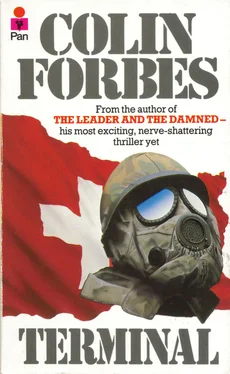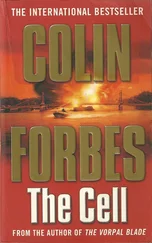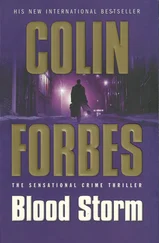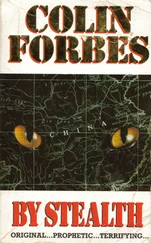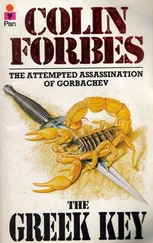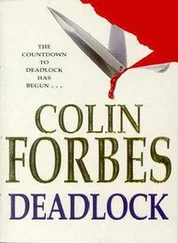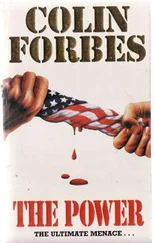Colin Forbes - Terminal
Здесь есть возможность читать онлайн «Colin Forbes - Terminal» весь текст электронной книги совершенно бесплатно (целиком полную версию без сокращений). В некоторых случаях можно слушать аудио, скачать через торрент в формате fb2 и присутствует краткое содержание. Жанр: Шпионский детектив, на английском языке. Описание произведения, (предисловие) а так же отзывы посетителей доступны на портале библиотеки ЛибКат.
- Название:Terminal
- Автор:
- Жанр:
- Год:неизвестен
- ISBN:нет данных
- Рейтинг книги:5 / 5. Голосов: 1
-
Избранное:Добавить в избранное
- Отзывы:
-
Ваша оценка:
- 100
- 1
- 2
- 3
- 4
- 5
Terminal: краткое содержание, описание и аннотация
Предлагаем к чтению аннотацию, описание, краткое содержание или предисловие (зависит от того, что написал сам автор книги «Terminal»). Если вы не нашли необходимую информацию о книге — напишите в комментариях, мы постараемся отыскать её.
Terminal — читать онлайн бесплатно полную книгу (весь текст) целиком
Ниже представлен текст книги, разбитый по страницам. Система сохранения места последней прочитанной страницы, позволяет с удобством читать онлайн бесплатно книгу «Terminal», без необходимости каждый раз заново искать на чём Вы остановились. Поставьте закладку, и сможете в любой момент перейти на страницу, на которой закончили чтение.
Интервал:
Закладка:
`Do tell me how.'
The flat, bored tone warned Kobler he was talking too much. The events of the previous night had imposed an enormous strain on him. He came to the point.
`We got lucky. One of our people spotted Seidler walking into the rail terminal. He bought a return ticket to Le Pont up in the Jura mountains. It's a nowhere place, a dot on the map. The interesting thing is he didn't use the ticket right away. He just bought his ticket and left the station. We are covering that station with a blanket. When he does use that ticket we'll be right behind him. I'm flying Graf and Munz to Basle Airport from the airstrip at Lerchenfeld…'
`They leave when?'
`They are on their way now.' Kobler checked his watch. 'I expect them to be at Basle Hauptbahnhof within the hour. And Le Pont would be an excellent place to deal with the final solution to the Seidler problem. Everything is under control,' he ended crisply.
`Not everything,' the voice corrected him. 'My intuition tells me the main danger is Robert Newman. You will yourself delete that debit item from the ledger…'
Having gone to bed in the middle of the night, Newman and Nancy slept until the middle of the following morning. Newman, for once, agreed without protest to the suggestion that they use Room Service for a late breakfast.
They ate in exhausted silence after dressing. The weather had not improved: another pall of dense cloud pressed down on the city. Nancy was in the bathroom when the phone rang and Newman answered it.
Who was that?' she asked when she came back into the bedroom.
`It was for you.' Newman grinned. 'Another wrong number…'
`That's supposed to be funny?'
`It's the best I can do just after breakfast. And I'm going out to see someone about what happened last night. Don't ask me who. The less you know the better the way things are turning out…'
`Give her my love…'
Which, Newman reflected, as he walked down the Munstergasse, had been a shrewder thrust than Nancy probably realized. The brief call had been from Blanche Signer. The photographs she had taken of the Berne Clinic from the snow-covered knoll were developed and printed. The surprise, when he arrived at her apartment, was that she was not alone. Carefully not revealing his name, she introduced a studious-looking girl who wore glasses and would be, Newman judged, in her late twenties.
`This is Lisbeth Dubach,' Blanche explained. 'She's an expert on interpreting photographs – normally aerial photos. I've shown her those I took of the Fribourg complex. She's found something very odd…'
The Fribourg complex. Blanche, Newman realized, was showing great discretion. First, no mention of his name. Now she was disguising the fact that the photos were taken at the Berne Clinic. On a corner table where a lamp was switched on stood an instrument Newman recognized in the middle of a collection of glossy prints.
The instrument was a stereoscope used for viewing a pair of photographs taken of the same object at slightly different angles. The overall effect obtained by looking through the lenses of the instrument conjured up a three-dimensional image. Newman recalled reading somewhere that during World War Two a certain Flight Officer Babington-Smith had – by using a similar device – detected from aerial photos the first solid evidence that the Nazis had created successfully their secret weapon, the flying bomb. Now another woman, Lisbeth Dubach, years later, was going to show him she had discovered what? As he approached the table he was aware of a tingling sensation at the base of his neck.
`This building,' Dubach began, 'is very strange. I have only once before seen anything similar. Take a look through the lenses, please…'
The laboratory! The building jumped up at Newman in all its three-dimensional solidity as though he were staring down at it from a very low-flying aircraft. He studied the photos and then stood upright and shook his head.
`I'm sorry, I don't see what you're driving at…'
`Look again, please! Those chimneys – their tips. You see the weird bulges perched on top – almost like huge hats perched on top?'
`Yes, I see them now…' Newman was stooped again gazing through the lenses, trying to guess what he was looking at could mean. Once again he gave it up and shook his head.
`I must be thick,' he decided. 'I do now see what you've spotted but I can't detect anything sinister..
`Once while visiting England,' Dubach explained, 'I made a trip to your nuclear plant at Windscale, the plant where Sir John Cockcroft insisted during its design that they had to install special filters on the chimneys…'
`Oh, Christ!' Newman muttered to himself.
`There was a near-disaster at Windscale later,' Dubach continued. 'Only the filters stopped a vast radiation cloud escaping. The filters you are looking at now at the Fribourg complex are very similar..
`But one thing we can tell you,' Newman objected, 'is that this building has nothing whatever to do with nuclear power.'
`There is something there they are making which needs the protection of similar filters,' Dubach asserted.
Newman, still absorbing the appalling implications of what Lisbeth Dubach had detected in the photos, now found himself subjected to a fresh shock.
As soon as they were alone, Blanche produced a sheaf of papers from an envelope and placed them on the sofa between them. They were, Newman observed, photocopies of typed originals. He had no suspicion that – by making photocopies of the sheets she had typed from the notebook – Blanche was protecting her source, Tweed.
She had gone to the length of typing them single-spaced, whereas her normal typing method was double-spacing, as Newman was well aware. She was careful with her explanation.
`Bob, I can't possibly tell you the identity of the client concerned. I'm breaking my iron-clad rule as it is – never to show information obtained for one client to another…'
`Why?' Newman demanded. 'Why are you doing it now?'
`Bob, don't push me! The only reason I'm showing you this data is because I happen to be very fond of you. I know you are investigating the Berne Clinic. What worries me is you may not realize what – who – you are up against. If you read these photocopies it might put you more on your guard. The power wielded by this man is quite terrifying…'
`So I read these and give them back to you?'
`No, you can take them with you. But for God's sake, you don't know where they came from. They were delivered to you at the Bellevue Palace. See, I've typed an envelope addressed to you at the Bellevue Palace. They were left with the concierge at the hotel…'
`If that's the way you want to play it…'
`I'll make you coffee while you're reading them. I could do with some myself. What Lisbeth Dubach told us has scared the wits out of me. What have we got into?'
Newman didn't reply as he picked up the photocopies and started reading. The report on Professor Armand Grange had, he realized quickly, been prepared by an experienced investigator who wasted no words. There were also signs that he – or she – had been working under pressure.
SUBJECT: Professor Armand Grange. Born 1924 at Laupen, near Berne. Family wealthy – owners of watchmaking works. Subject educated University of Lausanne. Brief period military service with Swiss Army near end World War Two.
Rumoured to be member of specialist team sent secretly into Germany to obtain quantity of the nerve gas, TABUN, ahead of advancing Red Army. Note: Repeat, rumour – not confirmed.
After war trained as doctor at Lausanne Medical School, followed by post-graduate work at Guy's Hospital, London, and Johns Hopkins Memorial Hospital, Baltimore, Maryland, USA. Brilliant student, always top of his class.
Читать дальшеИнтервал:
Закладка:
Похожие книги на «Terminal»
Представляем Вашему вниманию похожие книги на «Terminal» списком для выбора. Мы отобрали схожую по названию и смыслу литературу в надежде предоставить читателям больше вариантов отыскать новые, интересные, ещё непрочитанные произведения.
Обсуждение, отзывы о книге «Terminal» и просто собственные мнения читателей. Оставьте ваши комментарии, напишите, что Вы думаете о произведении, его смысле или главных героях. Укажите что конкретно понравилось, а что нет, и почему Вы так считаете.
